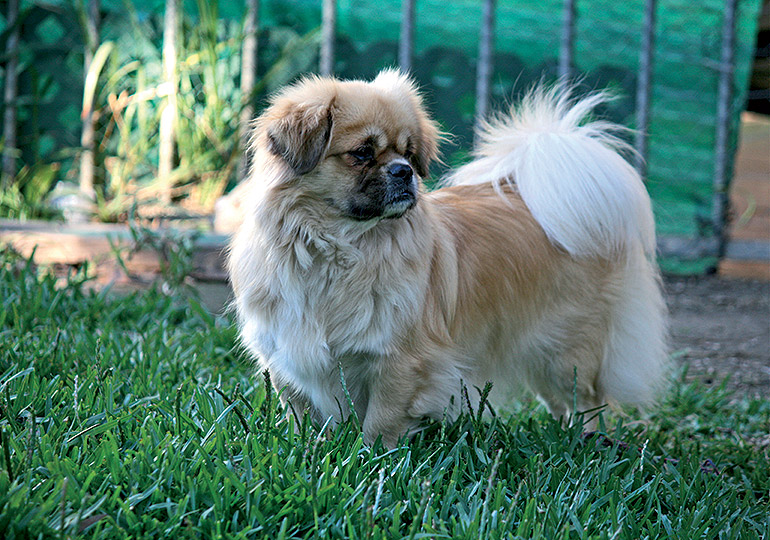GROUP 1 - TOYS
History
The Tibetan Spaniel is thought to have originated in the mountainous terrain and extreme weather conditions of Tibet around 1100BC.
The Tibbie, as it is affectionately known, lived with Buddhist monks: the monks’ belief in reincarnation means that all life is to be valued highly, and that all people may have been, or will be, a dog at some stage. The breed was also very popular among the wealthy people of Tibet.
Tibbies were also used to alert the larger Tibetan Mastiffs of approaching strangers, as well as to keep people warm. Some believe that the little dogs turned the monks’ prayer wheels, although there is no definite proof of this.
When the silk trade started in Tibet, Tibetan Spaniels were occasionally given as prized gifts, which could be how they came to be common in the west, but they were never sold. In the 19th century they found their way to Britain, and Australia’s first Tibetan Spaniels were imported by Myra Livett in 1974.
Characteristics
Tibetan Spaniels can be very clown-like in their characteristics and amuse their owners for hours but, although outgoing and friendly, they may be aloof with strangers. They should never be aggressive or timid.
Some people who have had other breeds do not realise when they first own a Tibetan Spaniel that they have entered a new era. It is not the Tibbie that is on trial, they will be owned by their dog.
Even the youngest puppies are highly intelligent. The breed still possess the traits of their ancestors, as they love to roam around large areas and be at the highest vantage point to watch for approaching dangers.
Temperament
Tibetan Spaniels are very affectionate, fun loving, amusing and intelligent. They are headstrong, so owners must establish themselves as the leader of the pack from the beginning. They adore their human family, and will want to be with them no matter what they are doing or where they are.
They love the beach, car, snow and just to snuggle up in bed. They can, however, sulk and seek revenge if they are upset.
Appearance
Tibetan Spaniels are small, active and alert. The breed should have a well-balanced outline, and its body should be slightly longer than its height at the withers. They have slightly bowed front legs and a slightly undershot bite, although in Australia a level bite is acceptable.
A Tibetan Spaniel should have a slightly (not exaggeratedly) small head in proportion to its body, and the head should be free from any coarseness, with an almond eye.
The Tibbie is a quick, free, positive mover, with a richly plumed, high-set tail carried in a curl over its back when on the move. It has a silky double coat, and females carry less coat and mane than dogs. All colours and mixtures of colours are possible.
Maintenance
Minimal maintenance is required. A brush once a week will keep the coat free from knots, except at the change of seasons when the double coat sheds.
During shedding, the undercoat needs to be regularly stripped to prevent irritation. Nails need to be trimmed regularly and teeth kept clean. It is also advisable, since the Tibbie has a pendant ear with feathering, to regularly check the inside of the ears and keep them clean and free from debris.
Health
Tibetan Spaniels are relatively hardy with minor health problems. Progressive retinal atrophy can be an issue, so it is advisable to obtain your Tibbie from a responsible registered breeder who health-tests their breeding stock.
Suitability
Tibetan Spaniels are adaptable, and suitable for older people and children alike. They enjoy Obedience, Agility and other sports and, as well as being a great family member, are also suitable for training as therapy dogs.
They are delightful, unique little animals, and to own one is a pleasurable experience. Being a Tibetan Spaniel owner comes with a warning though; you won’t be able to stop at just one!
Words: Pam Dron (2010)
In Conclusion
Now you know a little about the Tibetan Spaniel, you may think that this is the dog for you. Before you make a decision, please make contact with the breed club or your State controlling body for purebred dogs. They will be able to give you information about available puppies and also suggest dog shows where you can see the breed and speak to breeders. In this way you will gain a better perspective of the Tibetan Spaniel and its needs, and whether this breed would suit your lifestyle.
















